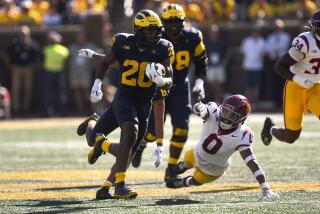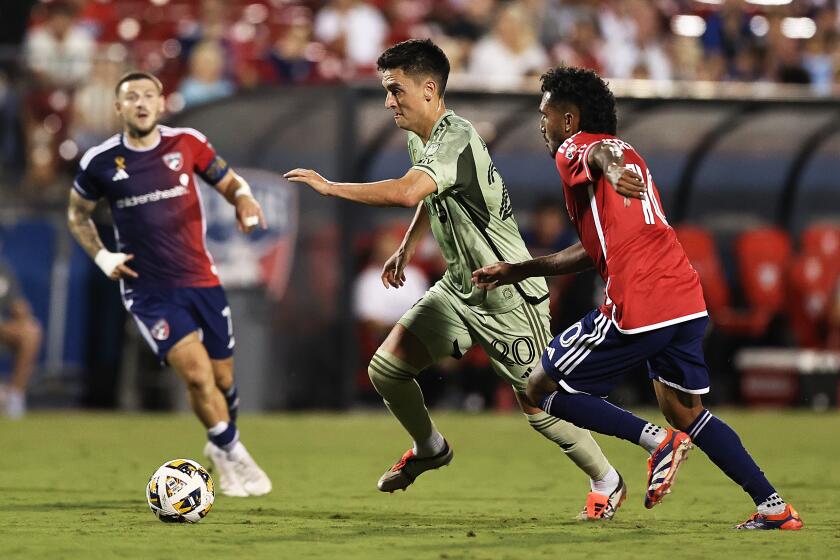Lovable jockey knows how to blaze a rail
He pumped his fist, again and again, years of obscurity galloped into a sparkling dust.
And this was before the race had ended.
“Best feeling in the world, seeing the final pole at the Kentucky Derby and nobody in front of you,” Calvin Borel said.
He thrust his helmet above his buzzed black hair and shouted to the sky, blew kisses at the fans, slapped hands with grooms and guards.
And this was while he was still on his horse.
“My one chance in a lifetime,” Borel said.
Then, the wonderful, wacky winning jockey of the 133rd Derby cried.
He cried when he was interviewed on the track, cried when he held the trophy aloft in the winner’s circle, cried unashamedly as women in flowered hats stared unabashedly.
A year after Barbaro, tears of joy.
Months after enduring death, the racing game again has life.
Street Sense finished first in Saturday’s Derby, but his 40-year-old former Louisiana bush track jockey was its real winner, serving as an engaging, eccentric reminder that the four-legged sport still has wings.
Calvin Borel is horse racing’s new face, with a shiner under his right eye.
Said Borel: “I hit myself with a bungee cord while taking out the garbage.”
Said his fiancee Lisa Funk: “He’s dangerous on the ground.”
Calvin Borel is horse racing’s new voice, with a thick Cajun accent, an eighth-grade education and little concern for anything not wearing a saddle.
During the post-race news conference, he was asked what it meant for him to know Queen Elizabeth II was watching from the Churchill Downs stands.
It turned out, he may have been the only one of the 156,635 folks in attendance who didn’t know who she was.
“The queen, baby,” whispered Funk, gently grabbing his hand. “Of England.”
While Funk denies reports that Borel is illiterate, she acknowledges that she has spent the last several years helping him learn to read.
“He’s all about the horses,” she said. “I take care of everything else.”
He began riding those horses in the Louisiana bayou when he was 8, he received his jockey license when he was 16, he has won more than 4,300 races in his career with earnings of more than $83 million.
But before Saturday, Borel had been in the Kentucky Derby only four times, and never finished higher than eighth, on a horse appropriately known as Ten Cents A Shine.
In the jockey world, he was the equivalent of the lovable, hard-working guy who buffs their shoes.
He is the only Derby jockey here who, as recently as three weeks ago, was cleaning horse manure out of stalls. He might be the only Derby jockey who will still show up at the barns at 5:30 a.m. to ride difficult horses.
He does it all to repay his older brother Cecil, a trainer who helped raise him after he dropped out of school.
“We lacked a lot of education,” Cecil said, “but we didn’t lack no work.”
How can you not cheer for a jockey who drove to the track Saturday in a truck with 130,000 miles on it and rode in four races besides the Derby?
“He’s a good man, a blue-collar man,” said jockey Mike Smith, who finished seventh on Tiago. “He gets up every day to go to work, and everybody likes him for it.”
How can you not cheer for a jockey who is nicknamed “Boo” because his parents said his birth was a “boo-boo?”
He nonetheless said he was riding for a sugar-cane-farming father who died three years ago, for a mother who is partially paralyzed from a stroke, and for the handful of fans who used to watch him ride in the clearings around St. Martinville, La.
“From back home when I was riding in the bush track from 8 years old, you wouldn’t imagine,” he said.
Borel used to ride horses inspired by chickens tied to their tails. He used to ride horses without wearing a helmet. He used to ride in races where, at the finish line, the jockeys leaped to the ground while the horses continued galloping into the fields.
Shortly before his 20th birthday, on a tiny Louisiana track, he was learning to ride the rail when the hole closed, the horse bucked, and Borel flew, landing in an infield heap.
He was in a coma, he lost his spleen, he broke several bones. But when he retuned to racing, his brother Cecil put him on the same horse at the same track and ordered him to ride the same rail.
This time, Borel won, and he’s been riding the rail ever since.
“It’s the shortest way around the race track,” he said with a shrug.
It was a daring rail ride that won Saturday’s race, with Borel holding Street Sense there in 19th place after half a mile, and in 17th place after three-fourths of a mile.
“I knew they were going pretty quick so I backed him up a bit,” he said.
A guy who has never won a Derby, riding a Derby favorite, yet having the patience to hold him back?
This is because Borel has the horse sense to know that when horses get tired, they begin to drift outside.
And sure enough, as the race continued, the path in front of him cleared, and he simply rode untouched along the rail until moving inside at the top of the stretch.
“I’m a jockey, but I know a lot about horses,” Borel said.
And, it turns out, he knows plenty about celebrating.
His fist pumps before the finish line were reminiscent of a Deion Sanders taunting an opponent before scoring.
His raised right arm after winning was like Tiger Woods’ initial reaction after sinking a big putt.
And his tears were cleansing, for a sport that has spent the last year in public mourning, a sport ready to heal, a sport of kings rejuvenated by a jock who has never heard of the queen.
*
Bill Plaschke can be reached at bill.plaschke@latimes.com. To read previous columns by Plaschke, go to latimes.com/plaschke.
More to Read
Go beyond the scoreboard
Get the latest on L.A.'s teams in the daily Sports Report newsletter.
You may occasionally receive promotional content from the Los Angeles Times.











